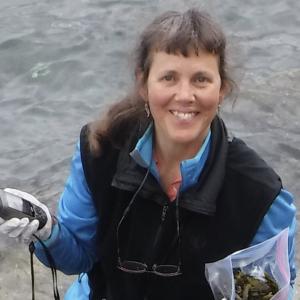Salish Sea Seaweeds: Safe to Eat?
Salish Sea seaweeds have been used as food, flavorings, medicine, and fishing gear since time immemorial. Today seaweeds are riding a tidal wave of interest. Spotlighted in the New York Times and chic restaurants, featured in chips, dips, and sips, “sea vegetables” are also being celebrated and revitalized as a traditional food by Tribes and First Nations, and Asian and Pacific Islander community members. Mmm-mariculture in the Salish Sea is part of a global wave, as kelp is being farmed for food, pharmaceuticals, habitat restoration, and remediation of ocean acidification in shellfish farms. Despite the rising interest in edible seaweeds, there is limited information on seaweed contaminate levels in the Salish Sea. Without this knowledge, consumers are left in the dark. Health-based consumption advisories cannot be determined. A recent study, led by Principal Investigator, Jennifer Hahn, and a team of researchers, scientists, and Salish Sea Tribe and First Nation community members helped answer a question whose time has come: Is Salish Sea seaweed safe to eat? Where? How much?
About the Speaker

Jennifer Hahn is a writer, seaweed researcher, Alaska wilderness guide, wild food forager, and teaching professor at WWU’s Fairhaven College. She teaches courses in Wild Food ecology and Sustainable foodways. Jennifer also leads Seaweed workshops for Salish Sea Tribes and The North Cascade Institute. A puzzling question raised in workshops--Is Salish Sea seaweed safe to eat? — inspired her to immerse herself in a toxicology research project lasting six years. Working with a dream team at the College of the Environment, The SeaDoc Society, Border Policy Research Institute, NOAA, Washington Department of Health, WA Department of Fish & Wildlife, and University of California Davis, plus 18 Tribes and First Nations who generously gave advisement and support—the first cross-border, cross-culture Seaweed toxicology study was born. Jennifer will share the story of these results. More info is available at PLOS ONE (open access) https://doi.org/10.1371/journal.pone.0269269
Environmental Speaker Series
The Environmental Speaker Series is hosted by the College of the Environment at Western Washington University.
The Series is free and open to the public. Talks are held each Thursday at 4:30 pm in Academic Instructional Center West room 204 - AW-204. Talks will also be streamed via zoom. Register with the Alumni Association for the zoom link. Paid parking is available in lot C.
Learn more about the Environmental Speaker Series
Subscribe to the Email List